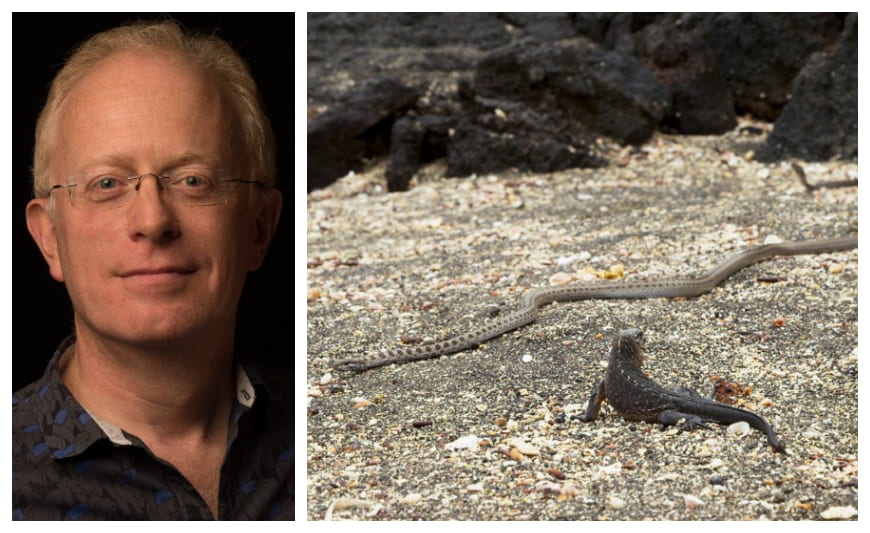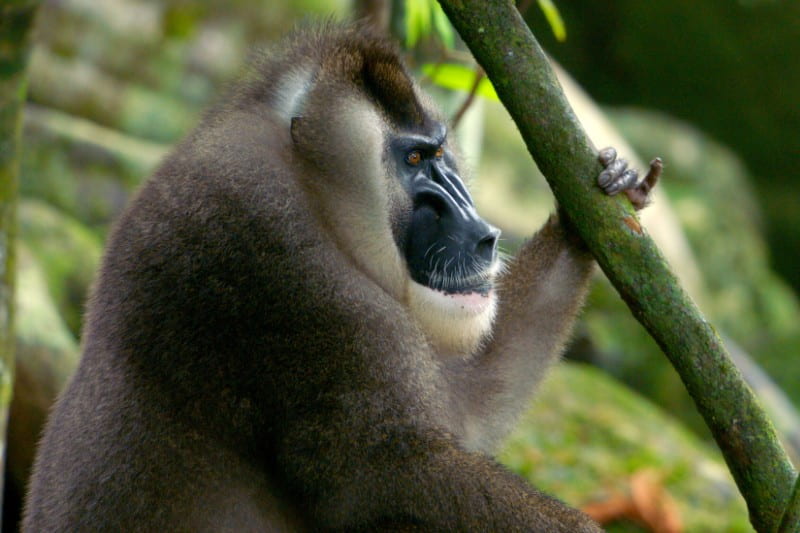
In 2016, millions of people up and down the UK gathered in their living rooms, biting their nails and peeping through their fingers as a newly hatched iguana fled from a swarm of snakes – narrowly escaping with its life. The iconic scene from Planet Earth II went viral worldwide and continued on to win the ‘Must-See Moment’ BAFTA award a year later. It’s a sequence that Mike Gunton (BSc 1979), Creative Director of BBC Studios Natural History Unit, has watched hundreds of times, both in the editing room and during the talks he’s given on the Natural History Unit in recent years.
‘I still love it every time I see it,’ says Mike, ‘especially the reaction it gets. It’s an extraordinary combination of brilliant camerawork and brilliant editing. That’s a once-in-a-generation kind of sequence to be honest.’
With a career spanning over 30 years and hundreds of credits including Planet Earth II (2016), Dynasties (2018) and Primates (2020), Mike has seen more than his fair share of incredible animal behaviour. But one of his favourite moments is also one of the first he witnessed.
‘We were in Madagascar in around 1988, filming ploughshare tortoises – which are one of the world’s rarest tortoises,’ says Mike. ‘During their mating season, the males will fight with each other and flip their opponent onto their back. Once one has flipped the other over, they’ll run to the female as quickly as they can and mate with her while the other is trying to get off its back.
‘To film them, we put our cameraman on a skateboard and wheeled him alongside these male tortoises, who were so crazed with lust that they didn’t even notice us! It was hilariously funny and we managed to get some nice shots of this male on his back, looking over his shoulder helplessly while the other one was mating with the female.
‘That technique of tracking the camera alongside the animals was quite unusual for wildlife filmmaking at the time, and it helped people to feel that they were right there with the animals rather than observing them. That’s what I’ve tried to do through all of my time: to get people to feel like they’re in the animal’s world.’

After initially wanting to be a social documentary filmmaker, Mike’s path was altered during his time as a Zoology student at the University of Bristol. ‘Before I started university, I’d taken a year out which was almost unheard of in those days. Arriving in Bristol was a bit of a shock and I did find that first term quite difficult. But there’s no question that university was the absolute making of me.
‘I was lucky to make friends with an amazing fellow student who was an extraordinary natural historian. I’d always loved natural history, but I’d never been fully immersed in it and this friend really got me interested in it.
‘Combined with that, I had a whole raft of brilliant professors. Professor Savage, who is sadly no longer with us, sticks out in my mind. He was a palaeontologist who was utterly inspiring, charismatic and incredibly knowledgeable. He took a few of us under his wing and I went from struggling in that first term to being an obsessive student, especially when it came to natural history.’
After his undergraduate degree, Mike went on to complete a PhD in Zoology at Cambridge University, before heading back to Bristol to join the BBC Natural History Unit. Since it was formally established in 1957 the institution has welcomed a host of talented individuals through its doors – many of whom also studied at the University of Bristol.
‘If you look at the veterans of natural history,’ says Mike, ‘almost everybody is ex-Bristol Zoology or certainly they’ve come through some part of the University.’
As well as being a vibrant university city, for wildlife filmmakers Bristol held the benefits of being close to the countryside, home to the South West’s regional media outlets and far enough away from London for the Natural History Unit to establish its own creative freedom.
‘Over time, the BBC Natural History Unit became a kind of epicentre that spawned satellites around it,’ says Mike.
‘Independent production companies started springing up, as well as post-production facilities focused on editing, camerawork, grading and sound. The Natural History Unit was like a stone falling into a puddle that created ripples going out. It drew the super-talented to the city. The number of BAFTAs and Emmys that have been won by the sound designers, editors and camera teams who live around here is enormous. They are literally the best in the world.’

Mike found that, even after leaving the University, the connections he made there proved incredibly useful when it came to creating wildlife films.
‘As a young producer I would often phone up one of the professors at the University and say, “Is this animal found in that place?” or “Have I found the right species?”. They were effectively our Google. People don’t realise that when I started working, all I had was a desk, a notebook and a phone. There was no computer of course – there was no internet! You relied on books and your contacts.
‘On a broad level there’s always been that connection between the Natural History Unit and the University,’ says Mike. ‘So for example, we’re currently filming The Green Planet and we’ve been working specifically with a couple of the University’s academics and with experts at the University’s Botanic Garden, who have been very helpful.’
Described as ‘Planet Earth, for plants’, the BBC’s upcoming series is due for release in 2022 – the BBC’s centenary year – and will delve into the hidden life of the green world that surrounds us. Sir David Attenborough fans will be pleased to hear that the veteran presenter will be returning to an onscreen role in the series.
‘David has done everything,’ says Mike, ‘but when I went to talk to him about The Green Planet and the approach we wanted to take he used this wonderful phrase. He said: “This is ploughing a new furrow.” I don’t think there was meant to be a horticultural pun in there but nevertheless!
‘These plant organisms play a huge role in the health of the planet and in all of our lives. But the world they’re living in is like a parallel universe, hidden by a misty curtain. By witnessing it, we can start to enter that world and to better understand it.’
Alongside never-before-seen moments captured through sophisticated time-lapse photography and robotic cameras, viewers can expect to see more of the world-class storytelling that has put the BBC Natural History Unit on the map.
‘You create jeopardy in wildlife filmmaking through individualisation,’ says Mike. ‘That seedling might be one of a million seedlings, but it’s also an individual that is struggling and wanting to beat all those other ones to the light. When you talk about it as an individual, suddenly you care about it and you’re immersed. If you can empathise with an iguana, a little scaly lizard, then it’s a small step to empathise with a seed, or with a tree.’
But while Mike and his colleagues spend much of their time documenting the wonders of the world, they also find themselves regularly bearing witness to the harrowing impact of the climate crisis.
‘You do see amazing endeavour and meet people who are taking action to reverse some of the transgressions that humans have placed upon the earth,’ says Mike. ‘That dedication is a wonderful element of humanity and it gives you hope. But you also see the opposite. You see rapacious destruction and self-centred greed which can make you feel depressed and helpless.
‘At 94, David has seen things change in his lifetime and I’ve seen a lot change in mine. There have certainly been some positives and the awareness around the environment is greater now, but I’ve returned to places which are in much worse situations than they were when I first visited them.’

For those who are passionate about protecting the planet and its biodiversity, Mike has a simple message:
‘Consume less. That’s what it all boils down to. This species consumes so much more than it needs in terms of resources like land, which is where the rest of the natural world needs to be. If we’re using that land or space to generate product for our consumption, then animals and plants can’t compete with us because we’re too powerful and therefore they get squeezed out more and more.
‘We still don’t understand enough about the intricacies of these webs of life. It’s like a Jenga tower – you can keep pulling blocks out but eventually someone will pull out one that makes the whole tower fall down. That’s the reason why I’ve become a bit less optimistic over time; there are still too many of those Jenga blocks being pulled out and nobody knows quite when the last one is going to go.’
So what role does television have to play in all of this? During his career, Mike has heard arguments on both sides: ‘Sometimes there’s a criticism that the celebratory natural history programmes that show people the wonders of the world paint a false picture,’ he says. ‘But you can also argue that they inspire people. People want to protect things that they care about and to care about them you need to understand them.’
And while advances in technology may go some way in furthering our understanding and empathy for the natural world, for Mike, strong storytelling is still key.
‘Fundamentally, you need imaginative, sensitive, and creative storytelling and to work out what an audience will value. What will give them pleasure and insight and make them feel that they’ve spent a valuable hour with your programme? I think that’s more important than any tech. The tech is a way to get people to experience that, but it still comes down to that key question: what do I want people who watch this to take away?
‘You hope that it’s not just an utterly ephemeral experience. So much television is of course and I’m sure ours is to a degree. But you hope that when somebody’s watched it, that some of what sticks in their memory is a care, concern, love for and will to protect the natural world. It’s the opposite of anthropomorphism, it’s trying to make people a little less anthropocentric. You hope that it will remind people that we have these other, extraordinary cohabitees on the planet and that, in the long run, it will be to our benefit to look after them and give them what they need.’

hello it’s oscar just wondering how many a level you need for this course